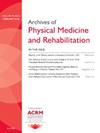基于虚拟现实的康复对中风患者心理健康和生活质量的影响:随机对照试验的系统回顾和荟萃分析。
IF 3.6
2区 医学
Q1 REHABILITATION
Archives of physical medicine and rehabilitation
Pub Date : 2025-04-01
DOI:10.1016/j.apmr.2024.10.006
引用次数: 0
摘要
研究目的本研究旨在进行荟萃分析,探讨基于虚拟现实(VR)的康复治疗对中风患者心理健康和生活质量的影响:研究选择:随机对照试验(RCT):比较脑卒中患者标准康复和基于 VR 的康复的有效性:纳入文章的数据由两位作者独立提取,如有任何分歧,则与第三位作者协商解决。提取的数据包括第一作者姓名、国家/地区、发表年份、样本量、参与者的平均/中位年龄、性别分布(男性比例)、VR 类型、康复持续时间、对比、干预和结果评估:共纳入 29 项研究,涉及 1,561 名中风患者。结果显示,与标准康复相比,基于 VR 的康复显著减少了焦虑症状[SMD=-0.97(95% CI [-1.84,-0.09],P 结论:与标准康复相比,基于 VR 的康复显著减少了焦虑症状:与标准康复训练相比,基于 VR 的康复训练能明显减轻中风患者的焦虑和抑郁症状,提高生活质量。持续时间超过六周的沉浸式 VR 康复项目对患者的改善最为明显,尤其是欧洲患者。本文章由计算机程序翻译,如有差异,请以英文原文为准。
Effect of Virtual Reality-Based Rehabilitation on Mental Health and Quality of Life of Stroke Patients: A Systematic Review and Meta-analysis of Randomized Controlled Trials
Objectives
To conduct a meta-analysis to investigate the effect of virtual reality (VR)-based rehabilitation on the mental health and quality of life of stroke patients.
Data Sources
The search strategy was conducted in 5 databases (PubMed, Scopus, Web of Science, Embase, and Cochrane Library databases) from inception to December 2023.
Study Selection
Randomized controlled trials (RCTs) comparing the effectiveness of standard rehabilitation and VR-based rehabilitation for stroke patients.
Data Extraction
Data from the included articles were extracted independently by 2 authors, with any disagreements resolved through consultation with a third author. The extracted data included the first author's name, country/region, publication year, sample size, mean/median age of participants, sex distribution (the proportion of males), VR type, duration of rehabilitation, comparison, intervention, and assessment of outcome.
Data Synthesis
A total of 29 studies involving 1561 stroke patients were included. The results showed that compared with standard rehabilitation, VR-based rehabilitation remarkably reduced anxiety symptoms [SMD=−0.97 (95% CI [−1.84, −0.09], P<.0001)], depression symptoms [SMD=−0.94 (95% CI [−1.46, −0.42], P<.001)], and improved quality of life [SMD=0.94 (95% CI [0.42, 1.45], P<.001)] of stroke patients. Subgroup analysis showed that immersive VR was particularly effective in reducing anxiety and depression symptoms compared to nonimmersive VR. The longer the duration of VR intervention, exceeding 6 weeks, the more significant the effect of improving anxiety and depression symptoms. Meanwhile, VR-based rehabilitation significantly improved the psychological state and quality of life of European patients.
Conclusions
VR-based rehabilitation significantly reduces anxiety and depression symptoms and enhances the quality of life in stroke patients compared to standard rehabilitation. The most notable improvements were observed with immersive VR-based rehabilitation programs over 6 weeks in duration, particularly among European patients.
求助全文
通过发布文献求助,成功后即可免费获取论文全文。
去求助
来源期刊
CiteScore
6.20
自引率
4.70%
发文量
495
审稿时长
38 days
期刊介绍:
The Archives of Physical Medicine and Rehabilitation publishes original, peer-reviewed research and clinical reports on important trends and developments in physical medicine and rehabilitation and related fields. This international journal brings researchers and clinicians authoritative information on the therapeutic utilization of physical, behavioral and pharmaceutical agents in providing comprehensive care for individuals with chronic illness and disabilities.
Archives began publication in 1920, publishes monthly, and is the official journal of the American Congress of Rehabilitation Medicine. Its papers are cited more often than any other rehabilitation journal.

 求助内容:
求助内容: 应助结果提醒方式:
应助结果提醒方式:


